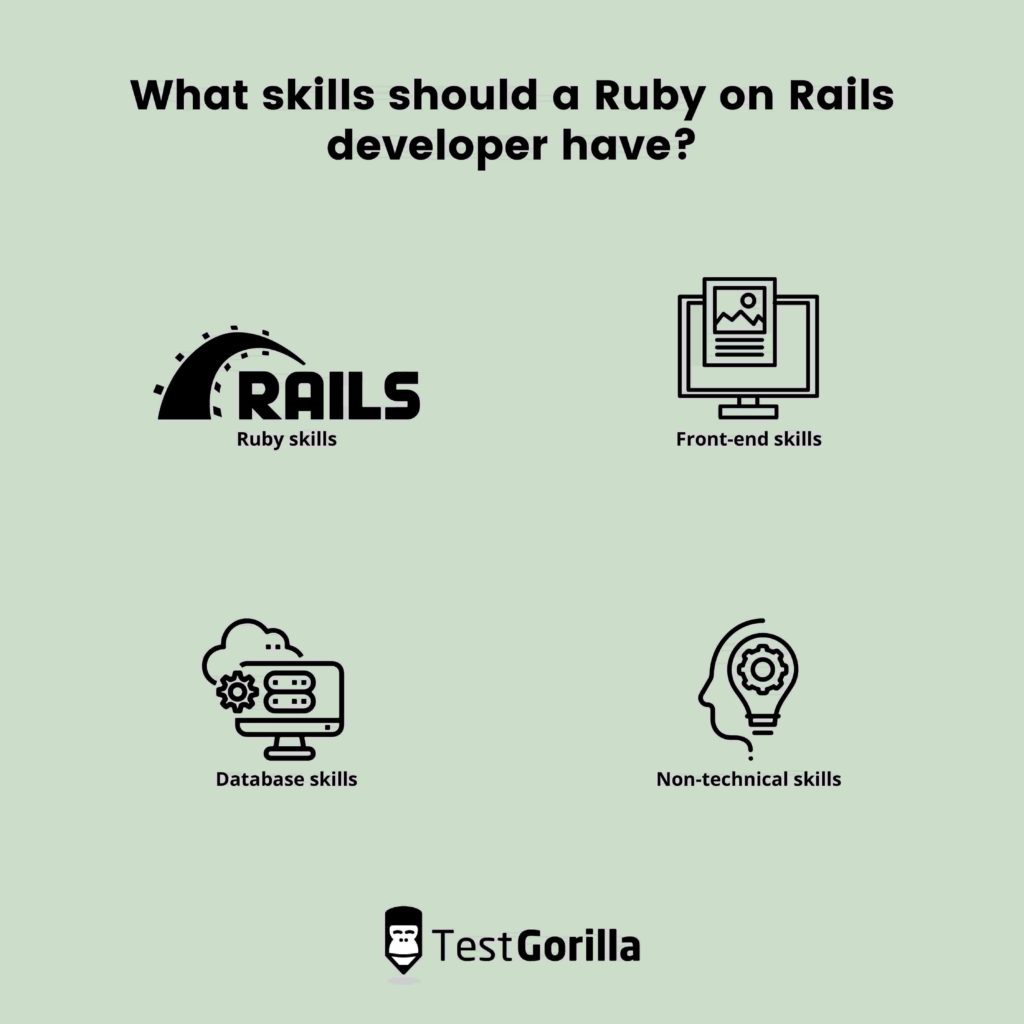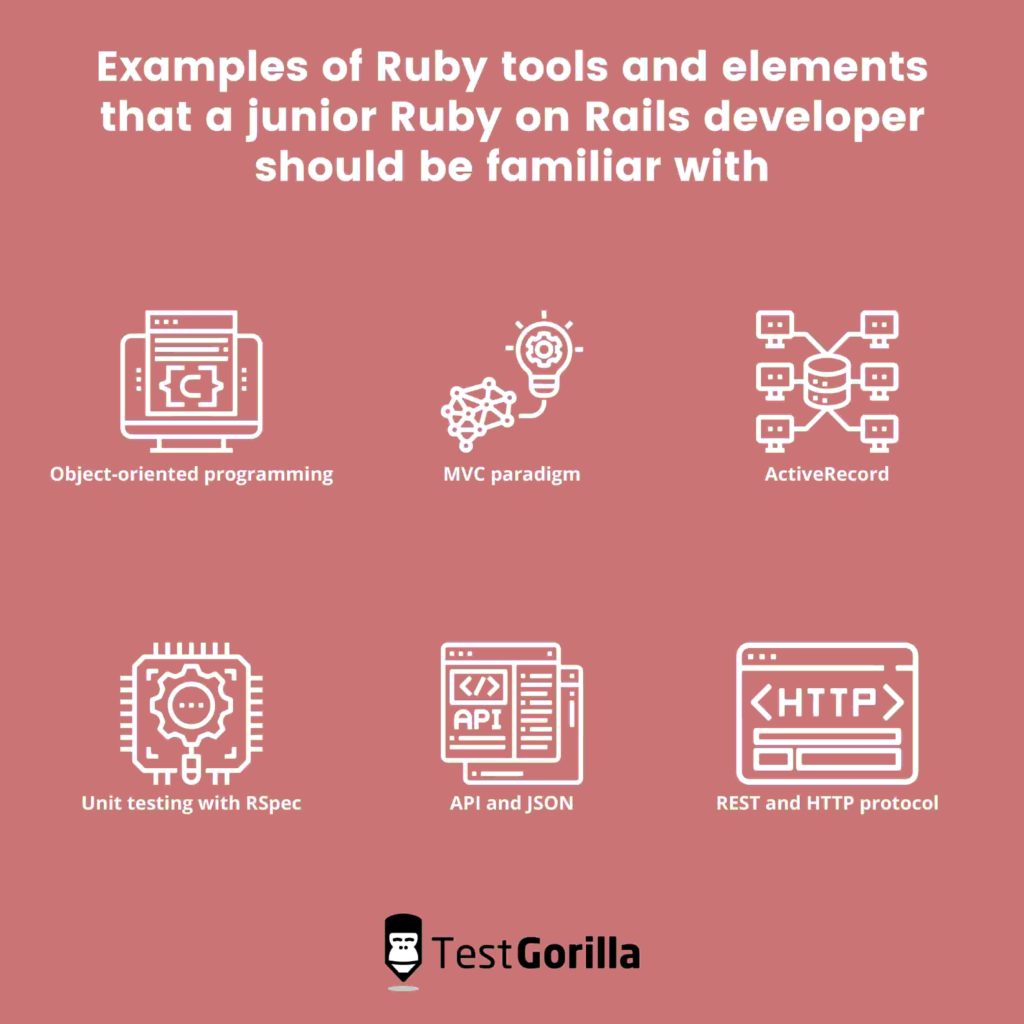Ruby on Rails (RoR) is a server-side framework that enables developers to code in the Ruby language while building websites and databases. The framework has permeated many organizations, with more than 130,000 companies using it for various purposes.
Therefore, learning about RoR developers and their skills can help you discover areas where they can impact your business. It also gives you the opportunity to harness the perks of the Ruby on Rails framework.
Learning about the role of a junior RoR developer is an excellent place to start. These developers primarily occupy entry-level positions yet possess a high level of technical skill. We’ll discuss several junior RoR developer skills and the best ways to test them.
Who is a junior Ruby on Rails developer?
A junior RoR developer is a professional who writes code in the Ruby language to build server-side web apps. Unlike typical coding languages, the RoR framework enables a developer to build web apps and work on several projects with less code.
Furthermore, a junior RoR developer may create databases and provide IT support to companies in several industries. Ideally, they’re back-end developers but occasionally work with front-end developers.
What does a junior Ruby on Rails developer do?
Junior RoR developers are typically responsible for the following:
Designing, building, and managing Ruby code
Incorporating data storage into valuable solutions
Collaborating with front-end developers to accomplish tasks
Working with various teams to create workflows and solidify management routines
Identifying and understanding challenges and providing reliable solutions
Maintaining the code’s quality throughout the entire development process
Creating methods to improve websites and rebuilding idle sites
What skills should a Ruby on Rails developer have?
Becoming an entry-level RoR developer requires one to entirely understand Ruby code and how to use it in a Rails framework. Aside from coding skills, there are other junior RoR developer skills you should consider.
Below, we categorize these skills and discuss why they are essential.
1. Ruby skills
RoR developers must have sufficient knowledge of Ruby and how to use it within the Rails framework. To be proficient with the framework, developers need to be able to easily manipulate in-built features and elements to accomplish tasks.
The following are some Ruby tools and elements within the Rails framework that a junior RoR developer should be familiar with:
Object-oriented programming: Most Ruby professionals work with object-oriented programming. A junior RoR developer should have basic knowledge of object-oriented programming features in Ruby, like classes and objects.
MVC paradigm: The MVC paradigm is a critical feature of the RoR framework. Junior RoR developers should be able to structure an app and adequately fit it into business logic.
ActiveRecord: Many web apps use some form of data persistence. It’s ideal for a junior RoR developer to have a basic understanding of ActiveRecord and its elements.
Unit testing with RSpec: RSpec is a popular tool for testing projects developed with the RoR framework. A junior developer must know how to write tests with RSpec since these tests usually determine whether an RoR project is approved.
API and JSON: Ideally, developers use RoR as an API provider. Hence, a junior developer should have basic knowledge of API and JSON.
REST and HTTP protocol: Many web apps operate as REST apps. It’s helpful for a junior developer to understand the HTTP protocol at a foundational level.
If you want to hire a Ruby developer rather than a Ruby on Rails developer, check out our guide to writing a Ruby developer job description.
2. Front-end skills
Front-end skills enable junior RoR developers to collaborate with front-end developers. Therefore, they should have basic knowledge of HTML, JavaScript, and other fundamental frameworks.
Furthermore, an understanding of cascading style sheets and their concepts is necessary for RoR developers.
3. Database skills
Fundamental knowledge of popular databases is a must-have in every developer’s skill set. It’s helpful to understand basic concepts of database engines like SQL and MongoDB and how to use them to set up databases on a local machine.
4. Non-technical skills
The following is a list of must-have soft skills for developers in a work environment. These skills determine how one communicates, interacts, and fits into an organization:
Workplace communication skills: Effective communication is one of the vital skills for any profession. That means developers must be able to interact with and convey ideas to colleagues and clients clearly to achieve goals.
Problem-solving skills: Regardless of their entry-level position, junior RoR developers must have a knack for solving problems. Their critical-thinking ability must be top-notch to consistently provide innovative solutions.
Teamwork: Another crucial skill for RoR developers is the ability to work with and lead a team. Team spirit is critical to one’s productivity and effectiveness in a work environment.
Research and critical thinking skills: Most of a junior developer’s work involves reading code and searching for data to solve tasks. As such, a junior RoR developer needs solid research and analytical skills when searching for information.
The best insights on HR and recruitment, delivered to your inbox.
Biweekly updates. No spam. Unsubscribe any time.
How to test a Ruby on Rails developer
It’s not enough to know what skills to look for in junior RoR developers. You also need to understand how to evaluate them and ask the right set of Ruby on Rails interview questions. That way, you can verify prospective employees’ proficiency with RoR.
Pre-employment tests are valuable in this regard. Particularly, TestGorilla’s Ruby on Rails test will enable you to assess candidates’ Ruby skills. You can also use the test to determine which of your applicants can independently manage development projects.
Furthermore, this test analyzes junior RoR developer skills in four areas: Active Record, Action Controller and Routing, Action View and Action Helpers, and other advanced concepts.
By using the Ruby on Rails test, you also remove bias from your hiring process since TestGorilla’s pre-employment tests measure skills objectively and are fair for all candidates.
Sign up with TestGorilla today, and start hiring a top-class junior Ruby on Rails developer.
Related posts
You've scrolled this far
Why not try TestGorilla for free, and see what happens when you put skills first.
















